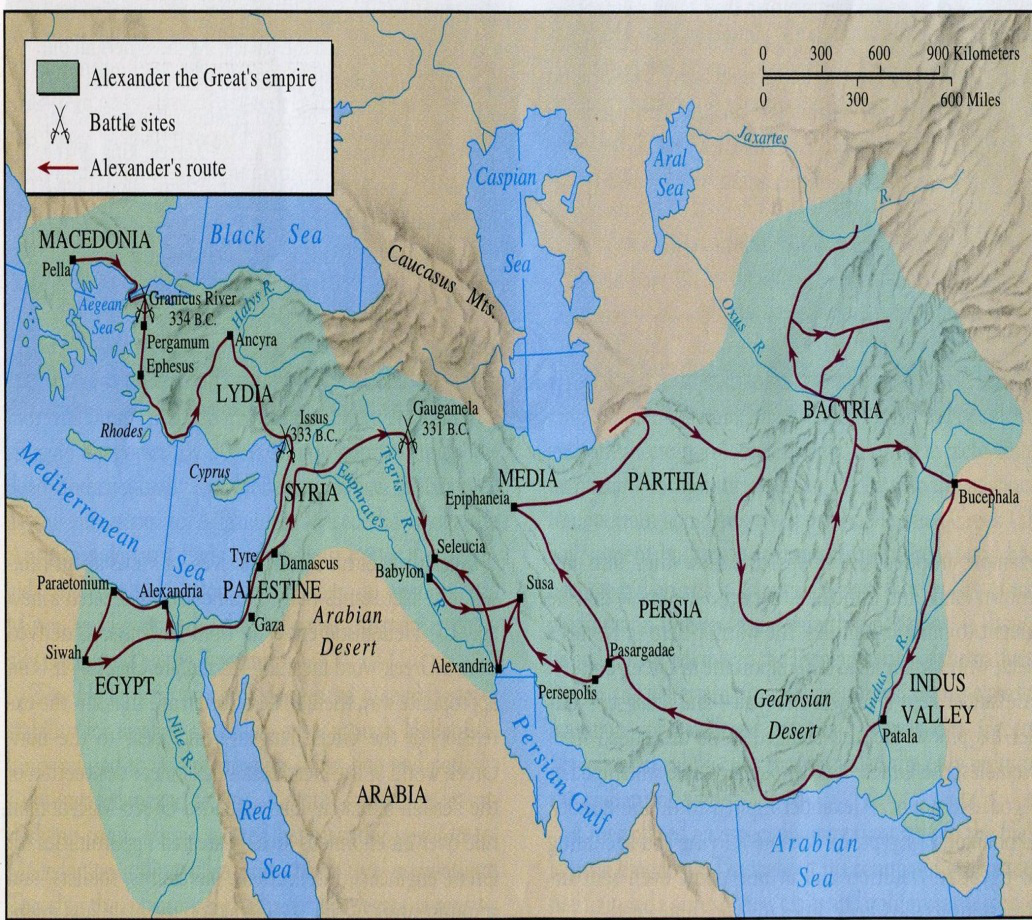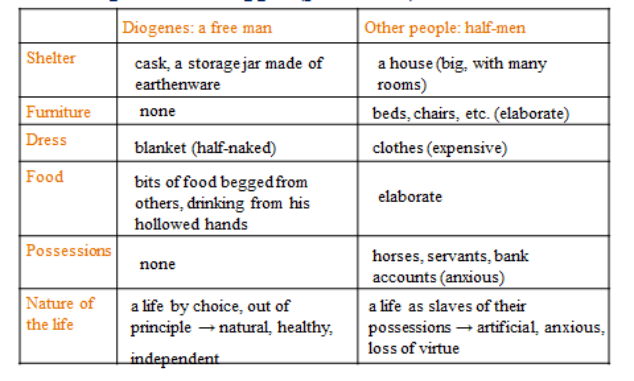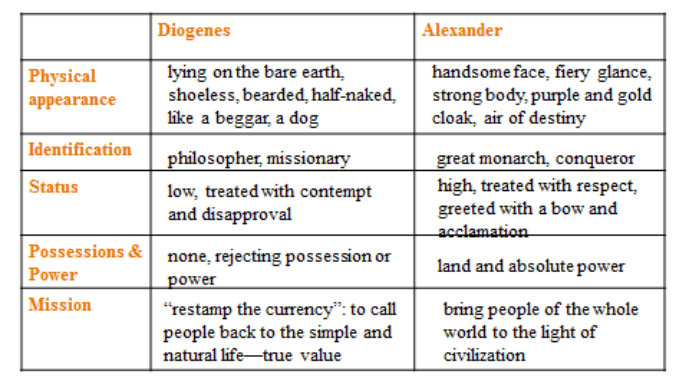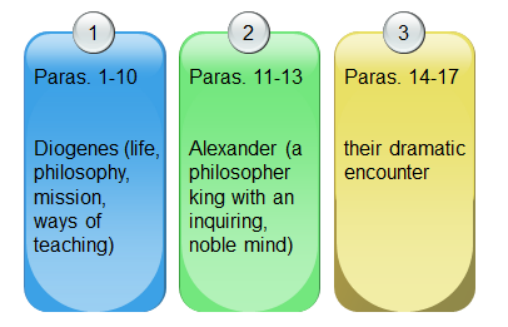Text Analysis: Diogenes and Alexander
 知识点一
知识点一
I.Warming up
1. Discussion
(1)What does the author tell us about Diogenes? Who was he? What was his philosophy? What did he think was the problem with people? How did he intend to help them? What were the key values he promoted? How, in his opinion, could we find true happiness?
(2)What does the author tell us about Alexander? What did this king have in common with Diogenes, the beggar? Why was Alexander considered a man of destiny?
(3)How would you contrast the two characters? Why did Alexander decide to visit Diogenes? What did Diogenes really mean when he said that Alexander was blocking the sunlight?
2. Paraphrase:
(1)Live without conventions, which are artificial and false; escape complexities and extravagances: only so can you live a free life. (para. 4)
(2)His life’s aim was clear to him: it was “to restamp the currency”: to take the clean metal of human life, to erase the old false conventional markings, and to imprint it with its true values. (para. 5)
II. Background
1. Who was Diogenes?
(1)A beggar
(2)A philosopher
(3)A missionary
2.Doctrine: Cynicism. the doctrine that scorned worldly needs and pleasures and held that virtue was the key to the only good
(1)Cynicism in modern sense:
1)the belief of a cynic, who maintains that people are all
2)motivated by selfishness, that no one will help others for
3)good and sincere reasons
(2)What are the major tenets (principles) of Cynicism? Do you find any expressions of these principles in the text?
1)self-sufficiency
2)shamelessness
3)outspokenness
4)perfection of virtue
3.Alexander
(1)Macedonian King: son of Philip
(2)The Thinker: student of Aristotle
(3)The Conqueror: Greece, Asia, Egypt
Why do you think he wanted to bring so many regions under his rule?


III. Text analysis
Character Analysis
1. Diogenes
(1) Diogenes: the beggar (paras. 1-3)

There are contrasts within the broad contrast.
(2)Diogenes: the philosopher (para. 4)
1)“A Socrates gone mad”: repositioning of convention below nature and reason
2)Three key principles:
a.living in accord with nature;
b.total disregard of convention;
c.independence (freedom) being the only true, lasting good;
(3) Diogenes: the missionary (para. 5)
Comparison with ordinary hermits
1) Similarities:
Both grew tired of human society with its complications and wanted to live simply.
2) Differences:
a.Hermits: went away to live simply—on a small farm, in a quiet village or a cave
b.Diogenes: had a sense of mission, deliberately chose to live in the busy streets in Athens or Corinth, in order to convert people
(4) Diogenes: the missionary (para. 5)
What was his mission?
1)“to restamp the currency”
2)call people back to the natural way of life—true life
(5) Diogenes: ways of teaching (para. 6)
How did Diogenes differ from other philosophers of his time?
1)Plato: taught his private pupils in his Academy, which he founded as one of the earliest centers of advanced learning in the world.
2)Aristotle: taught his own private pupils by the use of laboratory, instruments, and specimens.
3)Diogenes: taught all those who would care to listen by his own example or by taking people around him for examples.
He carried a lighted lamp in broad daylight and inspected the face of everyone he met.
2. Alexander: citizen of the world (paras. 11-13)
(1)King: different from other Macedonians
1)drinking?
2)women?
3)fighting?
(2)Thinker: Aristotle’s pupil, he learned
1)culture
2)philosophy
3)principles of scientific research
(3)Conqueror
1)took command of the League of Greek States
2)commander-in-chief of a new expedition against old, rich, corrupt Asia
3. The differences and similarities between the two historical characters.
(1) Differences:

(2)similarities:
1)Both were great thinkers.
2)Both had a sense of mission.
3)Both were “citizens of the world,” admiring the heroic figure of Hercules, who labored for mankind.
4)Both were free.
Structure

IV. Reinforcement:
Writing Techniques
1. Comparison & Contrast →examples
use transitional words or expressions to make comparison and achieve unity: not so (para. 5), the other…but for… (para. 6)
use transitional paragraph to achieve coherence
2. Parallelism
achieve increased strength, sounding more powerful, more effective, e.g. para. 14
3. Euphemism
e.g. done his business, natural acts
He was one, but not the other. (para.1)
Not so Diogenes. (para. 5)
But for Diogenes, … (para.6)
…Alexander was far older and wiser than his years. (para. 12)
Like all Macedonians he loved… (para. 12)
…he was a magnificent commander, but he was not merely a military automaton. (para.12)
Only Diogenes, although he lived in Corinth, did not visit the new monarch. (para.13)
Diogenes merely sat up…Diogenes said nothing. (para. 14)
He understood Cynicism as the others could not. (para. 17)
Like Diogenes, he admired… (para. 17)
…who labored to help mankind while all others toiled… (para.17)
4.Transferred Epithet
a figure of speech that carries the modifier across and puts it on to another word which is not normally modified by it, so as to stress the emotions or feelings
e.g. a mischievous pebble (para. 1) (It is Diogenes, not the pebble, that is mischievous.); amazed silence (para. 17) (It is the crowd, not the silence, that is amazed.)
5. Analogy
e.g. drawing a parallel between “change the values” and “restamp the currency” (para. 5)
Discussion
(1)If you think of yourself as a person with a mission, a mission to serve the people, would you rather be Diogenes with his philosophy or Alexander with his power?
(2)Does Cynicism have any relevance to today’s realities?
